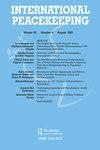Sweden’s 2017–18 UNSC Formula: Mobilizing the MFA’s Competitive Advantages, Highlighting Africa, and Boosting the E10
IF 1.3
2区 社会学
Q2 INTERNATIONAL RELATIONS
引用次数: 1
Abstract
ABSTRACT This article examines Sweden’s successful 2016 bid to serve at the United Nations Security Council (UNSC) and shows that the subsequent 2017–18 tenure relied on a formula with three key elements. One was to mobilize the competitive advantages of its Ministry of Foreign Affairs (MFA), and a second to systematically highlight Africa-related priorities. A third element was to boost the standing of the E10 category of members in day-to-day diplomatic practice. After securing a plurality of votes in the General Assembly, Swedish diplomats went to work with a unique constellation of concurrently serving likeminded countries, generally receptive to Stockholm’s priorities. The formula appears to have contributed to a solid performance in 2017–2018. That said, the UNSC is not conducive to individual E10 members having a lasting impact on its institutional memory.瑞典2017-18联合国安理会公式:调动MFA的竞争优势,突出非洲,推动E10
摘要本文考察了瑞典2016年成功申办联合国安理会(UNSC)的情况,并表明随后的2017-18年任期依赖于一个包含三个关键要素的公式。一个是调动外交部的竞争优势,另一个是系统地强调与非洲有关的优先事项。第三个要素是提高E10类别成员在日常外交实践中的地位。在联合国大会上获得多数票后,瑞典外交官开始与一群独特的同时服务的志同道合的国家合作,这些国家普遍接受斯德哥尔摩的优先事项。该公式似乎为2017-2018年的稳健表现做出了贡献。也就是说,联合国安理会不利于E10成员国对其机构记忆产生持久影响。
本文章由计算机程序翻译,如有差异,请以英文原文为准。
求助全文
约1分钟内获得全文
求助全文

 求助内容:
求助内容: 应助结果提醒方式:
应助结果提醒方式:


